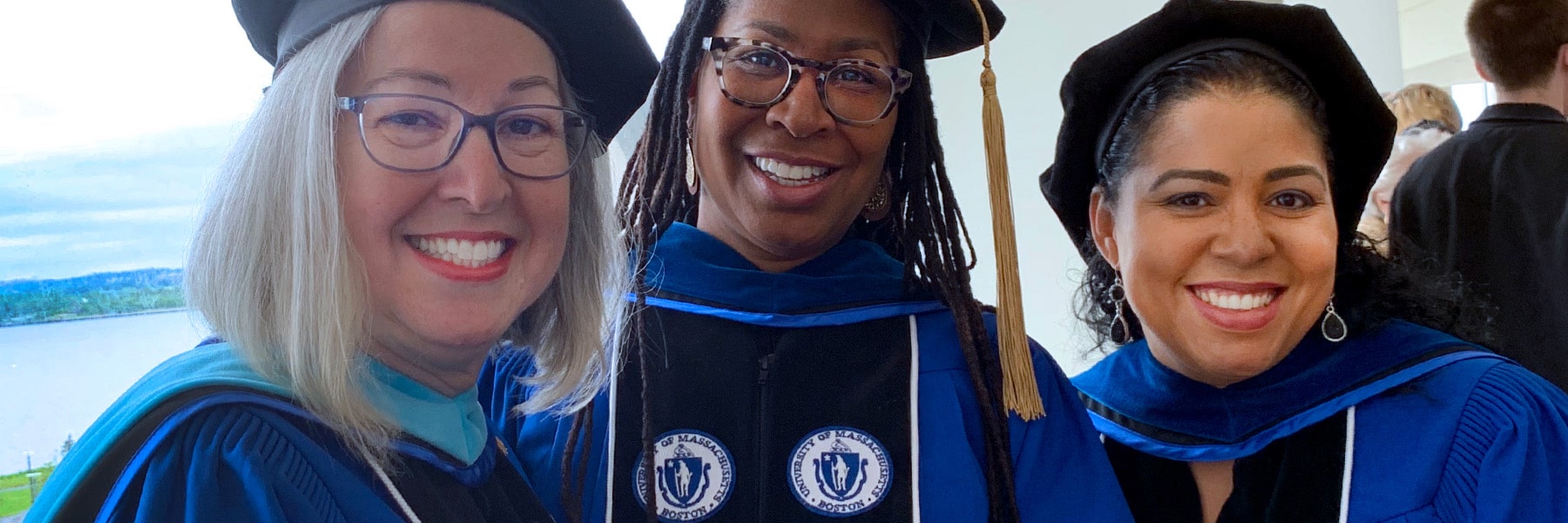Plan Your Education
Cohort Model
Each year, the program admits a cohort of between 10 to 12 students who take courses together throughout their program of study. The cohort model fosters collaborative approaches to learning, exploration, development, and problem solving. Through cohort development, students build strong peer-to-peer relationships that cultivate a vibrant learning environment founded in meaningful connection, active engagement, and a commitment to individual and group development. In the classroom, the cohort model fosters a learning environment in which students can establish meaningful connections to theory, research, and practice.
How to Apply
Applicants must meet general graduate admission requirements in addition to the following program-specific requirements:
- A bachelor’s degree from a regionally accredited U.S. institution of recognized standing or an international equivalent at the time of enrollment
- A minimum, cumulative GPA of 2.75 on a 4.0 scale (or international equivalent) in all undergraduate work
- A master's degree or the equivalent from a college or university of recognized standing
- Official transcripts for all institutions where you have earned more than 6 credits; if your transcript is in a language other than English, please include an English translation, validated by an official public translator
- Résumé or curriculum vitae
- Essay
Applicants are asked to write an essay that addresses four areas: practice, preparation, leadership, and anticipated contributions to cohort-based learning. This essay should be approximately 2,000 words in length. Be sure to address the following areas: - Reflect on your practice in higher education and how that practice relates to larger higher education issues.
- Reflect on your capabilities for leadership in higher education.
- Reflect on your preparation for doctoral-level work.
- Reflect on what you will contribute to the Higher Education Doctoral Program and what you will gain from it.
- Two (2) letters of recommendation
Recommenders should have worked closely with the applicant in an academic, professional, or community service setting. Letters should not be written by friends or family members of the applicant and should focus on the applicant’s abilities and past academic performance. The letters should also assess the applicant’s level of motivation for and commitment to a leadership role in higher education. Former professors familiar with the applicant’s academic abilities could address the applicant’s capacity to perform graduate-level work. Supervisors or colleagues at the current place of employment could describe and give evidence of the applicant’s potential as an initiator and implementer of organizational change. - Employer Agreement Form
The Employer Agreement Form shows year-by-year how the applicant and their employer will arrange the applicant’s work schedule to permit the applicant to meet the program’s requirements. These include three June sessions and a full weekday (Friday) on campus each week during the semesters leading up to the dissertation seminars. Please upload the Employer Agreement Form to the Documents section in the GradCAS application. - If applicable, request official TOEFL, IELTS, PTE and Duolingo scores to be sent to the University of Massachusetts Boston
All application materials should be sent directly to Graduate Admissions/GradCAS application. Do not send the materials to the Leadership in Education department office. Materials must be sent directly to admissions in order to be processed.
The admissions committee will interview all finalists before making its recommendations for acceptance into the program.
Deadlines & Cost
Deadlines: February 1 for summer
Application Fee: The nonrefundable application fee is $75. UMass Boston alumni and current students that plan to complete degree requirements prior to graduate enrollment can submit the application without paying the application fee.
Program Cost Information: Bursar's website
Curriculum - Higher Education EdD
Core Courses (21 Credits)
- HIGHED 601 - Educational Leadership Skills 3 Credit(s)
- HIGHED 610 - Administration and Governance in Higher Education 3 Credit(s)
- HIGHED 611 - Access and Equity in Higher Education 3 Credit(s)
- HIGHED 612 - Research on Students 3 Credit(s)
- HIGHED 620 - Teaching, Learning, and Curriculum in Urban Contexts 3 Credit(s)
- HIGHED 632 - Organization and Leadership in Educational Institutions 3 Credit(s)
- HIGHED 634 - Public Policy Issues in Higher Education 3 Credit(s)
Research Courses (15 Credits)
Please take the four classes below and an additional advanced research methods class chosen in consultation with your pre-dissertation advisor or dissertation committee chair.
- HIGHED 751 - Research Methods in Higher Education: Quantitative Analysis 3 Credit(s)
- HIGHED 752 - Research Methods in Higher Education: Qualitative Analysis 3 Credit(s)
- HIGHED 753 - Research Design in Higher Education 3 Credit(s)
- HIGHED 793 - Research Seminar on the Qualifying Paper 3 Credit(s)
Electives (3 Credits)
Complete one additional course chosen in consultation with your pre-dissertation advisor or dissertation committee chair.
Dissertation Seminars (6 Credits)
- HIGHED 891 - Dissertation Seminar 2-3 Credit(s)
- HIGHED 892 - Dissertation Seminar 3 Credit(s)
Dissertation Research (6 Credits)
- HIGHED 899 - Dissertation Research 3 Credit(s)
Curriculum - Higher Education PhD
Core Courses (21 Credits)
- HIGHED 601 - Educational Leadership Skills 3 Credit(s)
- HIGHED 610 - Administration and Governance in Higher Education 3 Credit(s)
- HIGHED 611 - Access and Equity in Higher Education 3 Credit(s)
- HIGHED 612 - Research on Students 3 Credit(s)
- HIGHED 620 - Teaching, Learning, and Curriculum in Urban Contexts 3 Credit(s)
- HIGHED 632 - Organization and Leadership in Educational Institutions 3 Credit(s)
- HIGHED 634 - Public Policy Issues in Higher Education 3 Credit(s)
Research Courses (18 Credits)
Complete the four courses below and two advanced research methods courses chosen in consultation with your pre-dissertation advisor or dissertation committee chair.
- HIGHED 751 - Research Methods in Higher Education: Quantitative Analysis 3 Credit(s)
- HIGHED 752 - Research Methods in Higher Education: Qualitative Analysis 3 Credit(s)
- HIGHED 753 - Research Design in Higher Education 3 Credit(s)
- HIGHED 793 - Research Seminar on the Qualifying Paper 3 Credit(s)
Electives (9 Credits)
Complete three courses chosen in consultation with your pre-dissertation advisor or dissertation committee chair.
Dissertation Seminars (6 Credits)
- HIGHED 891 - Dissertation Seminar 2-3 Credit(s)
- HIGHED 892 - Dissertation Seminar 3 Credit(s)
Dissertation Research (6 Credits)
- HIGHED 899 - Dissertation Research 3 Credit(s)
Graduation Criteria
Higher Education EdD
Complete 51 credits from 17 courses including eight core courses, five research courses, one elective, two dissertation seminars, and six credits of dissertation research.
Doctoral candidacy: Completion of a qualifying paper.
Dissertation: Compose and defend a dissertation based on original research.
Independent study: Students can enroll in up to four independent studies (3 credit hours each).
Transfer courses: Students can transfer a total of 12 credits: 6 from prior or concurrent coursework at other institutions and 6 from prior coursework at UMass Boston. No transfer coursework from other institutions or UMass Boston taken more than seven years before admission to the program will be accepted.
Statute of limitations: Seven years.
Higher Education PhD
Complete 60 credits from 20 courses including seven core courses, six research courses, three electives, two dissertation seminars, and six credits of dissertation research.
Doctoral candidacy: Completion of a qualifying paper.
Dissertation: Compose and defend a dissertation based on original research
Independent study: Students can enroll in up to four independent studies (3 credit hours each).
Transfer coursework: Students can transfer a total of 12 credits: 6 from prior or concurrent coursework at other institutions and 6 from prior coursework at UMass Boston. No transfer coursework from other institutions or UMass Boston taken more than seven years before admission to the program will be accepted.
Statute of limitations: Seven years.
Student Outcomes
Student Success
The success of our program is measured by the success of our students. The program review team highlighted the following: “the retention and graduation rate [of the Higher Education Doctoral Program] is well above national averages for all students and students of color, at 87.1% and 91.1%, respectively.
Students described how their participation in the program was already contributing to their professional advancement. Two-thirds of student survey respondents (34 of 51, 66.7%) indicated that they have received a job promotion since starting the program. In fact, 9 students (17.6%) reported that they have received two or more job promotions since starting the program. Furthermore, 75.6% of student survey respondents indicated that they have taken on increasing levels of responsibility in their job, since starting the program. The students attributed their job promotions and new responsibilities to the knowledge and skills that they gained in the program:
“My most recent promotion is directly attributable to the knowledge and skills that I have developed in the program. Specifically, the knowledge I gained about student success, university policy, and finances were key factors in my job interview and that led to this promotional opportunity.”
Educating Scholar-Practitioners
Students noted that the curriculum is relevant to their work as a practitioner. A total of 61.5% of student survey respondents strongly agreed with the statement that “the content in the program's required courses is relevant to my work as a higher education practitioner,” and 35.9% agreed with that statement. Only one student disagreed (fall 2016 survey). The survey of recent alumni demonstrated a similar level of agreement for this item: 58.3% strongly agree and 41.7% agree (fall 2016 survey).
Survey results showed that students find the curriculum to be highly relevant to higher education as a field of study. Current students noted that the program’s courses have enhanced their understanding of research and theory in the field of higher education; 77.5% strongly agreed and 22.5% agreed (fall 2016 survey).
The program is distinguished by five defining characteristics:
- The program serves experienced professionals who are committed to strengthening and expanding their capacities for leadership to advance equity and racial justice in higher education.
- The program contributes to increasing the racial and gender diversity of leaders in higher education and promotes critically conscious, equity-minded, and asset-based approaches to leadership.
- The program is structured through a cohort model, with cohorts comprised of students from a range of identities and experiences, who enter the program at the same time and take a series of courses together. The knowledge contributed and developed by cohort members serves as an important learning resource as students move forward through the coursework.
- The program prepares scholar-practitioners as educational leaders who can contribute to organizational change for equity and racial justice in higher education.
- The program emphasizes the development of equity-minded scholar-practitioners who can apply research and theory to issues of policy and practice, as well as contribute new knowledge to the field of higher education through their own research.
Contact
Graduate Program Director Jay Dee
jay.dee [at] umb.edu
(617) 287-7694

Leadership in Education
Learn more about UMass Boston's Leadership in Education department, our research, and our faculty.
Explore the Department of Leadership in Education
College of Education & Human Development
Learn more about the faculty, research, and programs that make up our College of Education & Human Development.
Explore College of Education & Human Development
